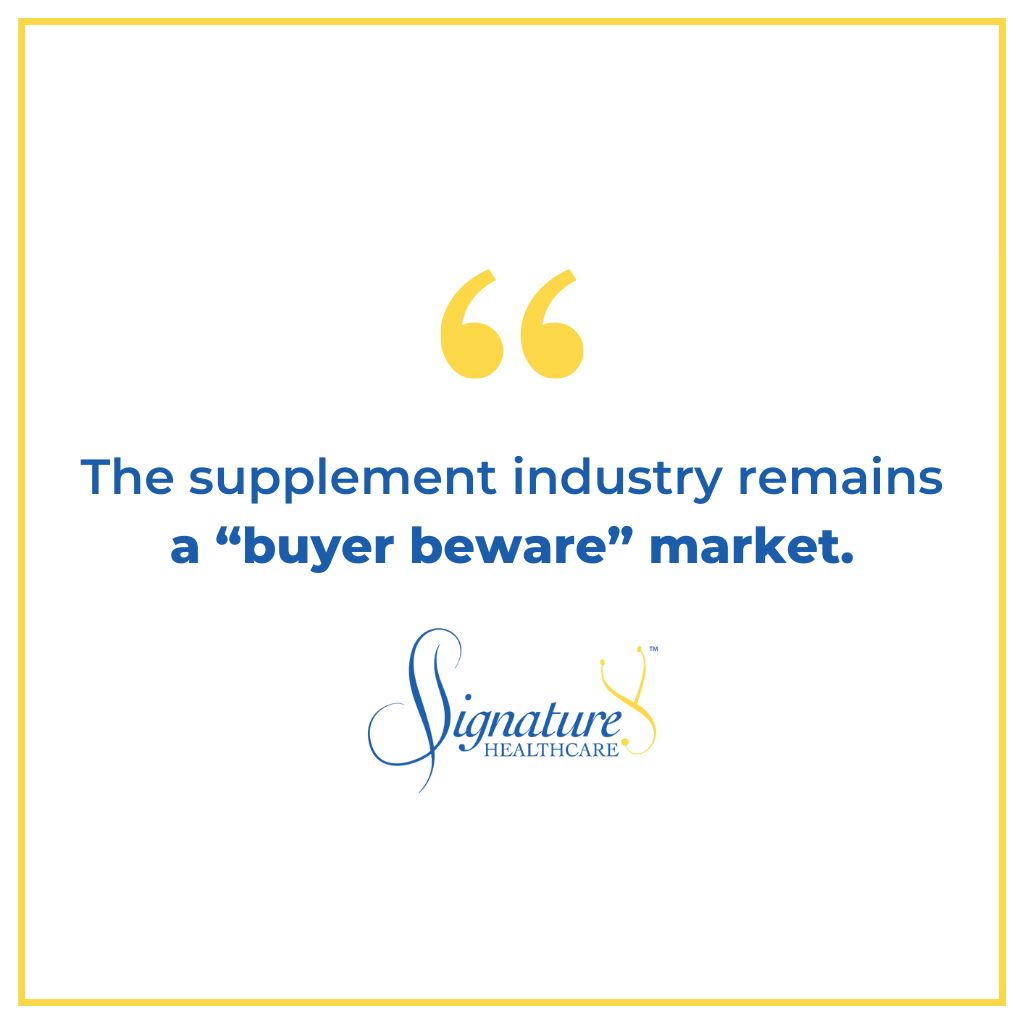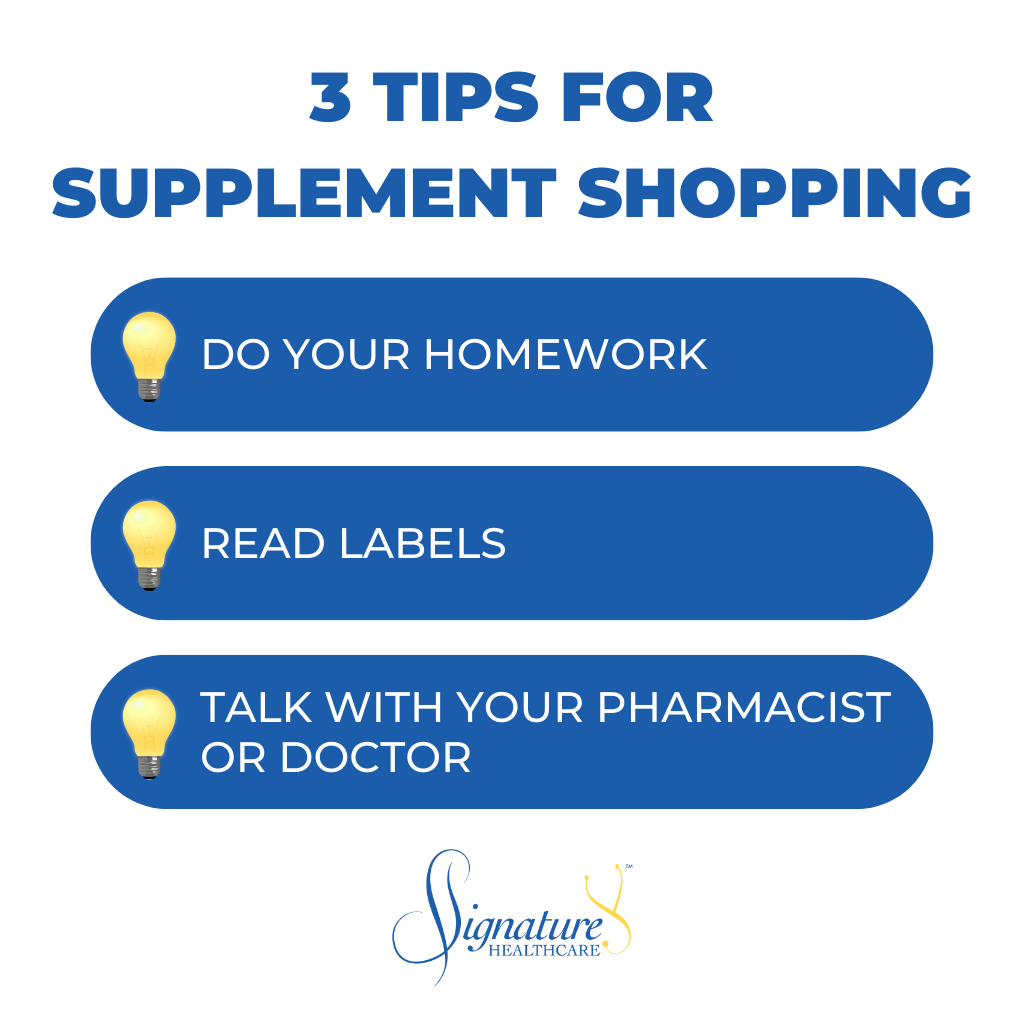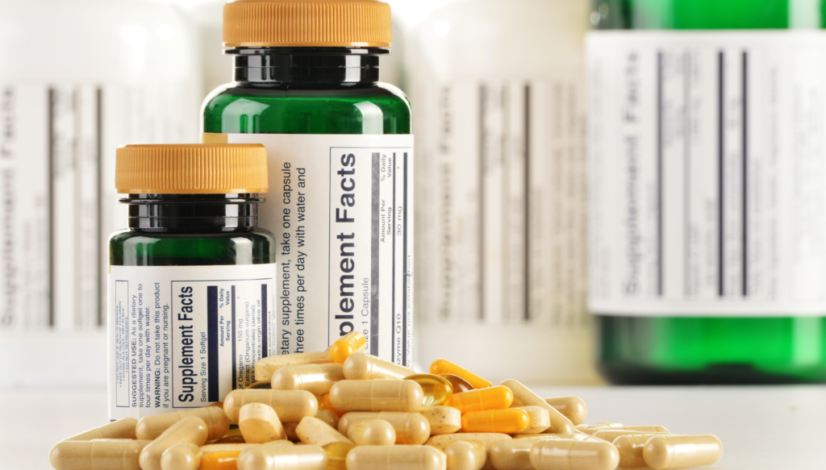How to Tell if a Supplement Is Good Quality
Almost 60% of all American adults take at least one dietary supplement every day. Perhaps you’re among them, or you’re interested in what vitamins or herbal supplements can do for you.
You may already know which supplement may be indicated to help support your health, but that information only gets you so far. Picking the brand of supplement that’s ideal for you can be a quest, especially when stores and websites display thousands of them.
- Do you know how to tell if a supplement is of good quality?
- Are you clear on how much to take each day?
- If you trust a company’s vitamin D supplement, does that guarantee their magnesium product is just as good?
- If a product claims to be 100% natural, does that make it safe?
- Are you wasting money on products that don’t contain what they claim or may have ingredients you don’t want or need?
- Do you feel you need a course in Latin to decipher some supplement names?
As physicians, we want our patients to have access to high-quality products, know how to choose one that’s right for them, and understand how to use it safely. Today’s blog post will help you feel empowered to do your own research.
Quality Factors
Not sure how to tell if a supplement is good quality? Start your research by asking the following questions:
Vitamins and Minerals
- From where does the product manufacturer source its ingredients?
- Does the product contain any extra ingredients? Are they necessary?
- Does the product have the potential to be contaminated during processing or distribution?
Botanicals and Herbal Products
- Where was the plant grown? Was it imported? (Many countries don’t have the same safety regulations as we do regarding planting and growing.)
- Was the plant treated with fertilizer, herbicides, or pesticides?
- Is the plant itself potentially harmful to consumers?
- How is the plant product formulated? Could extra ingredients affect the way it works in the body?
- How is the plant product packaged? Was it refrigerated? Not refrigerated?
Your lifestyle and your body’s needs are unique, so you must ask these questions to find a supplement that’s safe for you.

Who’s in Charge Here?
The supplement industry remains a “buyer beware” market. While the FDA has some authority to provide safety guidelines for over-the-counter supplements, it doesn’t have the same regulatory oversight it has with pharmaceuticals.
This level of quality control could mean some of the agents for sale aren’t high quality, or they could even be adulterated. Plus, some labels make false claims about products’ ingredients or effectiveness — and often get away with it.
Some say we need tighter regulation to avoid adverse effects. Others argue that more regulation may mean fewer people can purchase products that benefit them.
This year, the FDA will review over 30 years of regulation to rework certain guidelines, better control supplement options, and make them safer. We can only watch and wait to see how the supplement market responds.

Tips for Supplement Shopping
You don’t need to learn Latin or earn a pharmacology degree to learn how to tell if a supplement is good quality. Here’s Signature Healthcare’s step-by-step guide:
1. Do your homework.
A great way to find safe, well-vetted vitamins, supplements, and herbals is by seeking third-party oversight from one of the sources below.
Turn to these experts for thorough product descriptions and a regular crash course in how manufacturers and their suppliers operate:
NSF.org
NSF is the only American national standard for testing and certifying dietary supplements.
By working with laboratory teams around the world, this organization assesses product composition to verify that labels accurately reflect product ingredients and their level of purity. Their work includes testing for vitamins, minerals, herbs, and botanicals, as well as amino acids, concentrates, metabolites, constituents, and extracts.
NSF assessment also considers the presence of contaminants:
- Toxic elements like lead and mercury
- Microorganisms and bacteria (yeasts, molds)
- Pathogens (salmonella, E. coli, staph)
- Mycotoxins released by fungi
- Pesticides
Search the NSF site for over-the-counter supplements.
U.S. Pharmacopeia (USP)
USP is a scientific nonprofit founded by independent experts. The organization focuses on ensuring consumers have access to a trustworthy supply of pure, safe, high-quality supplements, medicines, and foods.
USP addresses quality assurance, sets standards for lab testing of products, and helps manufacturers distribute quality products.
Search USP’s site for vitamins, herbs, and other supplements.
Consumer Lab
It’s a smart idea to purchase over-the-counter supplements and botanicals directly from well-qualified manufacturers rather than through online resellers such as Amazon.
If you buy health and nutrition products regularly, I recommend purchasing a Consumer Lab membership. Consumer Lab provides valuable, bias-free information and evaluates products and their manufacturers independently.
As a member, I can access up-to-date reviews of nearly every popular type of dietary supplement and health food, ask questions, and keep tabs on product cautions or recalls.
2. Read labels.
Look for clear, well-defined ingredients and amounts present. Reliable, high-purity supplements always present label data straightforwardly and thoroughly.
Carefully check the recommended dosage on the label. Some supplements recommend dosing three times a day to get the benefit. I consider anything more than two doses a day to be one too many! If the label asks you to dose too frequently, look for a product with a higher concentration that can be taken less often.
More isn’t always better. Like anything else, excessive dosing of a supplement is unnecessary and can do more harm than good.
Investigate the different formulations your supplement comes in. Is anything hard for you to swallow or tolerate? A liquid or capsule pill might be easier on your system than a tablet.
When in doubt, turn to an expert. Dr. Andrew Weil’s website offers great advice on reading labels and lets consumers submit questions.
3. Talk with your pharmacist or doctor.
Your trusted healthcare and medical professionals may have helpful backgrounds in supplements. They can recommend high-quality products and dependable manufacturers and advise you on how to tell if a supplement is good quality.
Some pharmacies offer medication therapy management (MTM) sessions, usually covered by insurance, during which pharmacists will evaluate any medications you currently take and advise you on supplements that interact safely and effectively with their prescription drugs.
You’ll also get good advice from a doctor of integrative medicine, or a naturopathic or osteopathic physician.
Trying Supplements
Considering vitamins, supplements, or botanicals? It’s great that you’re looking for ways to optimize your health and well-being.
At Signature Healthcare, we want you to be an active participant in your healthcare. Be safe and proactive about learning how to tell if a supplement is good quality, in partnership with your doctor or pharmacist.
Bring us your questions. Let’s sit down and talk.

Dr. Russ Greenfield
Dr. Greenfield was among the first physicians to train under the direct guidance of Dr. Andrew Weil and has been practicing Integrative Medicine for over 25 years. He is Board Certified in Emergency Medicine and Lifestyle Medicine.

